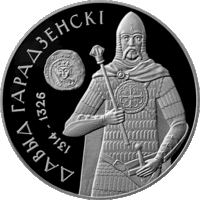
David (Belarusian: Давыд Гарадзенскі, Lithuanian: Dovydas Gardiniškis, killed in 1326) was a castellan of Grodno and one of the most famous military commanders of Gediminas, Grand Duke of Lithuania. He might have been a son of Daumantas of Pskov and great grandson of Alexander Nevsky. Maciej Stryjkowski claims that David was married to one of the daughters of Gediminas. He seems to have been a middleman between the pagan Gediminas and the Christian princes of the Rurikid family and frequently led in battle the united Lithuanian–Ruthenian armies.
David is mentioned for the first time in 1314 when he helped to relieve a siege of Navahradak by the Teutonic Order. He did not engage in battle, but instead destroyed food supplies that the Order left behind. As a result, many knights died of starvation and exhaustion on their way back to Prussia. In 1319, David was in charge of 800 men who raided Prussia as far as Łyna river. However, on their way back they were attacked by the Komtur of Tapiau (present-day Gvardeysk) and lost all booty.
Four years later, he took part in the Pskovian punitive expedition to Danish Estonia. At the time, Pskov was nominally under Novgorod, which was entangled in a conflict with Tver and could not defend Pskov from the Livonian Order. In response to the looting in Ladoga and Narva provinces, David, invited by Pskov nobles, led an expedition to Danish Estonia, an ally of the Order. In March and May 1324, the Order unsuccessfully besieged his native city.
Since the end of 1324, David was based in Grodno. In November 1324, he raided the lands of Masovian dukes who were allied with the Teutonic Order. Later, they complained to the pope that David destroyed one city, 117 villages, and many churches and monasteries. In 1326, he led the Lithuanian armies on the raid on Brandenburg and on the way back he was traitorously killed by a Masovian knight.
References
 This article incorporates text from a publication now in the public domain: "Давид, староста гродненский" . Brockhaus and Efron Encyclopedic Dictionary (in Russian). 1906.
This article incorporates text from a publication now in the public domain: "Давид, староста гродненский" . Brockhaus and Efron Encyclopedic Dictionary (in Russian). 1906.- Šapoka, Adolfas (1937). "Dovydas". In Vaclovas Biržiška (ed.). Lietuviškoji enciklopedija (in Lithuanian). Vol. 6. Kaunas: Spaudos Fondas. pp. 1334–1336.